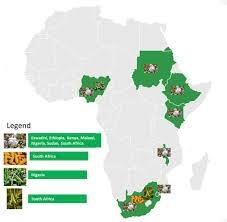 Inflation in the cost of food worldwide and dependency on the Ukraine and Russia for wheat have resulted in a reappraisal of genetically modified (GM) crops in African nations. Over the past two decades, “Green” activists have disseminated false information regarding GM technology and persuaded autocratic leaders of some African nations to impose bans on both consumption of GM grains and planting of GM seed.
Inflation in the cost of food worldwide and dependency on the Ukraine and Russia for wheat have resulted in a reappraisal of genetically modified (GM) crops in African nations. Over the past two decades, “Green” activists have disseminated false information regarding GM technology and persuaded autocratic leaders of some African nations to impose bans on both consumption of GM grains and planting of GM seed.
Egypt is now moving in the direction of domestic cultivation of GM crops. The Head of the Agricultural Committee of the House of Representatives of Egypt recently commented on the intention to lift a ban on importation of GM seeds. The Nation already allows importation of GM soybeans and corn, mainly from the U.S. The introduction of GM technology will not necessarily resolve the immediate issue of a shortage of wheat, for which there are no approved commercial cultivars. The shift in policy does indicate progress in recognizing the inherent advantages provided by GM crops.
 Nigeria will conduct an extensive field evaluation of TELA corn developed for drought resistance. Already in use in the Republic of South Africa, TELA corn will be trialed on 180 farms in ten states with oversight by the Institute for Agricultural Research at the Ahmadu Bello University. In addition to the ability to thrive under hot and dry conditions TELA corn resists cornstalk borer and armyworm both of which are significant pests in African nations.
Nigeria will conduct an extensive field evaluation of TELA corn developed for drought resistance. Already in use in the Republic of South Africa, TELA corn will be trialed on 180 farms in ten states with oversight by the Institute for Agricultural Research at the Ahmadu Bello University. In addition to the ability to thrive under hot and dry conditions TELA corn resists cornstalk borer and armyworm both of which are significant pests in African nations.
Ghana will evaluate GM crops and specifically cowpeas that are also cultivated in Nigeria. The domestic variety expressing Bt was developed by the Savannah Agriculture Research Institute, demonstrating a significant increase in yield coupled with a reduced need to apply insecticides. The action by the Government of Ghana is in response to demands by farmers to introduce GM crop varieties following successive crop failures.